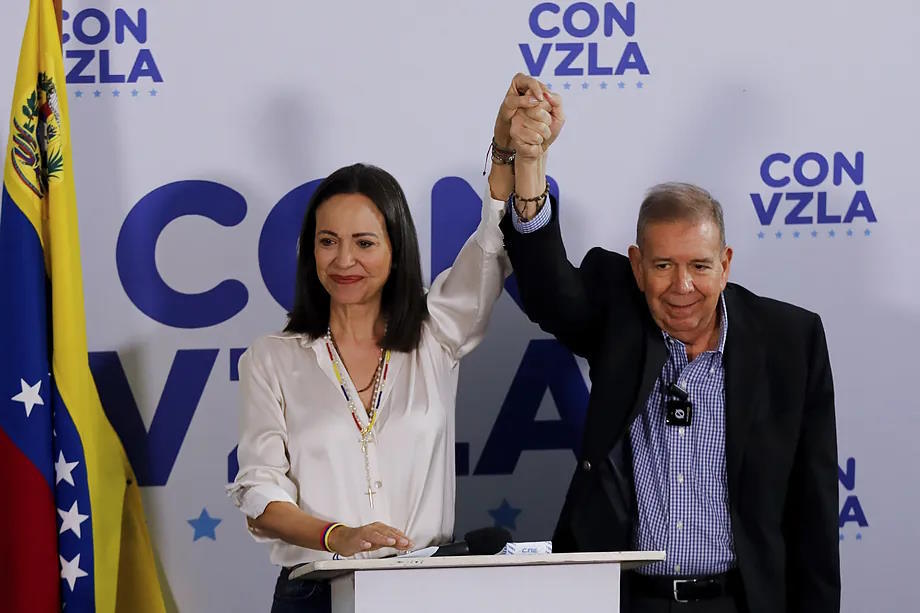The Basque Nationalist Party will support this Wednesday with its five votes in congress the non-binding motion of the PP urging the Government to already recognize Edmundo González Urrutia as the winner of the elections on July 28 and, therefore, the elected president of Venezuela.
The votes of the Basque nationalists are essential for the non-binding motion presented by the PP and which is being debated this afternoon in Congress to move forward. Unless there are last-minute changes, tomorrow Wednesday, when the initiative is voted on, it will receive the support of the Popular Party (137 votes), Vox (33 votes), UPN and Coalición Canaria (2 votes), and the PNV (5 votes). In total, 177 deputies surpassing the absolute majority will give the green light to the initiative.
However, the approval of the non-binding motion, although it implies a de facto mandate that Congress sends to the Government, can be disregarded by the Executive. It is more of a symbolic measure than a step with effective results, but undoubtedly, it is very important for the opposition to the regime.
The spokesman for the Basque nationalists in Congress, Aitor Esteban, has appeared before the press to confirm the sense of the vote of their five deputies, although this has not prevented him from taking a dig at the PP, assuming that there is a clear background of confrontation and wear and tear of Pedro Sánchez's Government in their initiatives regarding Venezuela. "Unfortunately, Venezuela is used as a battering ram for the two major parties to launch attacks. We should remove it from internal political strife," he said.
Nevertheless, the PNV values the request of the Venezuelan democratic opposition that insists on the international recognition of Edmundo González, and this is what decisively influences the vote in favor of the proposal by the Popular Party.
"I believe," Esteban stated, "that there is no doubt about the opposition's victory. There is no time for nuances, and we will always stand against Maduro, repression, and obscurantism. What Parliament will approve will be a symbolic position. But the opposition wants that recognition, and the PNV will vote in favor."
The uncertainty now focuses on the position that the Socialist Group will take. On the other hand, parties like Sumar, Podemos, BNG, or EH Bildu have already expressed their rejection. These groups try to maintain a neutral position, relying on the argument that it is not appropriate to recognize the victory of any candidate until the electoral records are known. The regime of Nicolás Maduro has so far refused to make them public.
The PP, for its part, maintains pressure on the PSOE and the Government. The Socialists have submitted an amendment to the text proposed by the Popular Party, an amendment that the PP spokesman, Miguel Tellado, has labeled as "unworthy and indecent," and therefore, they will not accept it. The PP believes that the presentation of this "unacceptable" amendment is nothing but a strategy by the Socialists to shield their vote against the non-binding motion after its rejection. The amendment aligns with several of the PP's demands but does not advocate for the recognition of Edmundo González and, furthermore, praises and calls for support for Zapatero's work in Venezuela.
According to the Popular Party's spokesman, "it is scary to see that Pedro Sánchez considers Edmundo González's exile a triumph to celebrate." The Government maintains that it "has to decide whether it stands with Maduro or with democracy. If it opts for the latter, it must work for González to return to Venezuela and be able to take office on January 10."
The PSOE considers that the PP's stance on Venezuela "makes no sense." For the Socialists, it is incomprehensible that the Popular Party considers "helping Maduro" by welcoming Edmundo González. The PSOE criticizes the request for González's recognition "without records and without anything."
Their spokesman in Congress, Patxi López, has stated that with Zapatero, the release of dozens of Venezuelan prisoners has been achieved, something that "those who shout in the PP" have not accomplished, mentioning Cayetana Álvarez de Toledo, Miguel Tellado, and Esteban González Pons. López believes that with his position, the PP leader, Alberto Núñez Feijóo, is only making a "ridiculous" display. López has also directly attacked his popular counterpart in Congress, whom he said only knows how to "spew insults."
